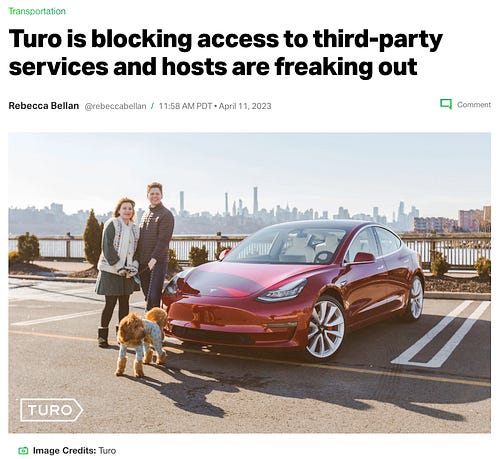There's an article in TechCrunch yesterday (techcrunch.com/2023/04/…) about Turo blocking access to third party services; I think it has some really interesting implications for the mobility/transportation startup space in general.
Evolve as you grow. When we were initially devising how Turo would work (or as we called it back in ~2010, RelayRides,) the idea was that owners would rent out their existing cars: generally well loved ol' Priuses and small SUVs. That way non car owners could do a big haul at the grocery store, or go out to the countryside for a day of hiking. The idea that the supply side would evolve to essentially be mini fleet operators was totally beyond the scope of anything we had originally envisioned. Could we have figured that out sooner? (Other opportunities we didn't quite see - some early owners were essentially begging us to let them operate Lyft / UberX type business with their cars. Oops!)
Third parties can extend your reach, but carry risks. Third party tools like CarSync and FleetWire offer valuable tools for owners, and allowing an environment like that to flourish can make your core marketplace service more valuable, without bogging you down in additional development cycles. Better yet, they come up with tools you probably wouldn't even think of! But as those tools gain traction, it's a double edged sword. They now have a detailed database of a huge tranche of your power users. What's to stop them from rolling out their own competitive service, messaging everyone that already uses their tool about it, and winning them over with a slightly better payout margin? The tough part of building a marketplace is reaching scale - third party apps can just bootleg off of your existing size! (See - just about every marketplace that grew by scraping Craigslist.)
I'm curious - what do folks think?

